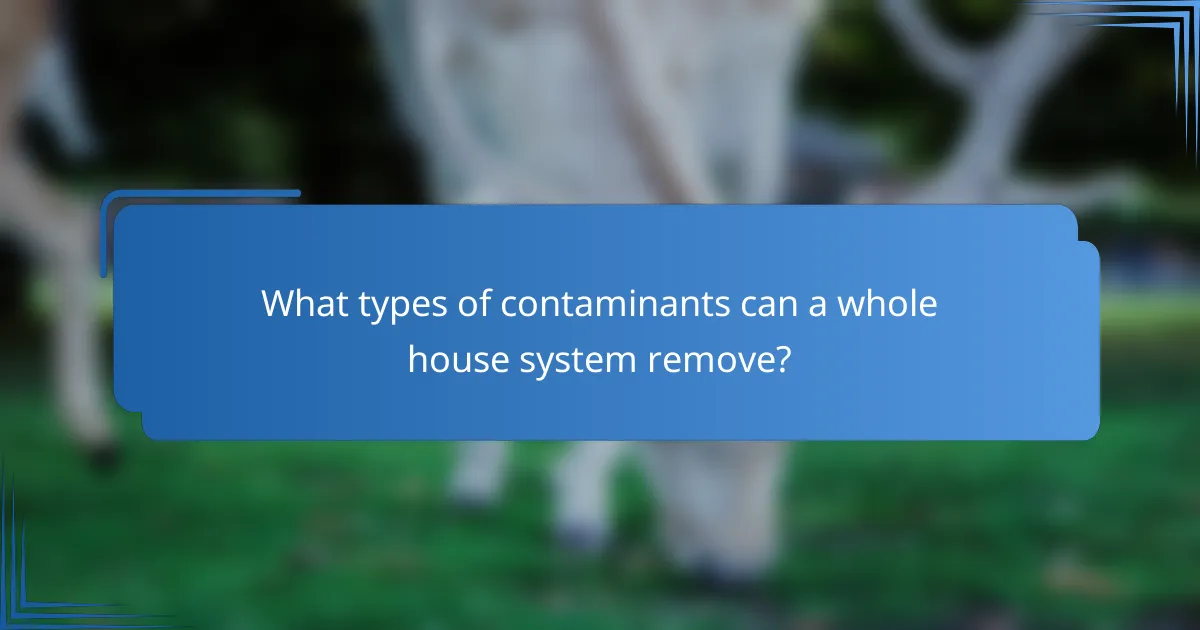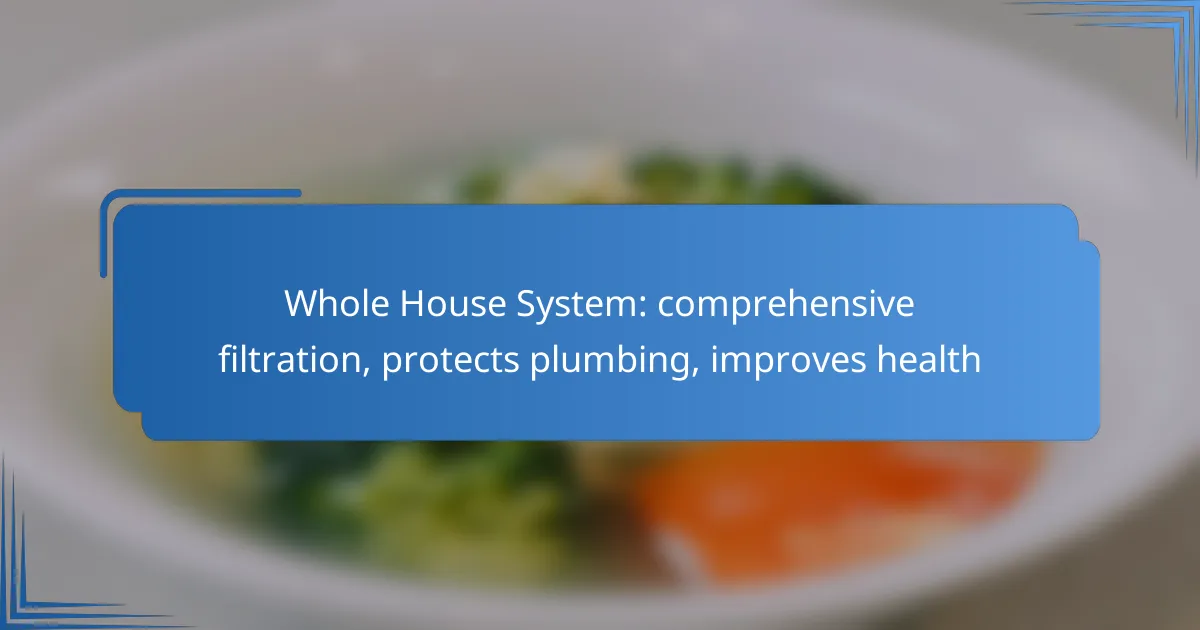A whole house filtration system provides a comprehensive solution for ensuring clean and safe water throughout your home. By effectively removing harmful contaminants like chlorine, heavy metals, and microbial pathogens, it not only protects your plumbing and appliances but also significantly enhances your overall health and well-being.

How does a whole house filtration system improve health?
A whole house filtration system enhances health by removing harmful contaminants from drinking and bathing water, leading to cleaner, safer water throughout the home. This comprehensive approach not only protects plumbing but also contributes to overall well-being by reducing exposure to pollutants.
Reduces contaminants
A whole house filtration system effectively reduces a wide range of contaminants, including chlorine, lead, sediment, and bacteria. By filtering water at the point of entry, it ensures that all taps and appliances deliver cleaner water, minimizing the risk of health issues associated with these impurities.
Common contaminants like heavy metals and pesticides can have serious health implications, particularly for vulnerable populations such as children and the elderly. Regular maintenance and filter replacement are crucial to maintain optimal performance and ensure contaminants remain at safe levels.
Enhances water quality
Improved water quality from a whole house filtration system leads to better taste, odor, and clarity. This enhancement encourages more water consumption, which is vital for hydration and overall health. Clean water also improves the effectiveness of cooking and cleaning, contributing to a healthier living environment.
Filtration systems can vary in technology, including activated carbon, reverse osmosis, and UV purification, each targeting specific contaminants. Choosing the right system based on local water quality reports can maximize benefits.
Supports immune health
By reducing exposure to harmful microorganisms and pollutants, a whole house filtration system supports immune health. Cleaner water helps the body function optimally, reducing the likelihood of illnesses linked to contaminated water sources.
Investing in a filtration system can be particularly beneficial in areas with known water quality issues. Regular testing of water quality can help identify potential risks and ensure that the filtration system is effectively protecting your health.

What are the benefits of whole house filtration systems?
Whole house filtration systems offer significant advantages, including protecting plumbing, extending the lifespan of appliances, and enhancing the quality of water by improving taste and odor. These systems ensure that every tap in your home delivers clean, filtered water, contributing to better health and comfort.
Protects plumbing infrastructure
Whole house filtration systems safeguard plumbing by removing harmful contaminants such as sediment, chlorine, and heavy metals. This filtration reduces the risk of corrosion and buildup in pipes, which can lead to costly repairs and replacements over time.
By maintaining cleaner water, these systems help prevent clogs and extend the life of your plumbing infrastructure. Regular maintenance and filter changes are essential to ensure optimal performance and protection.
Increases appliance lifespan
Appliances that use water, such as dishwashers and washing machines, benefit from whole house filtration systems. Clean water reduces scale buildup and mineral deposits, which can damage internal components and decrease efficiency.
Investing in a filtration system can lead to significant savings by prolonging the lifespan of these appliances, potentially adding years to their operational life. Regularly replacing filters is crucial to maintain this benefit.
Improves taste and odor
Whole house filtration systems effectively eliminate unpleasant tastes and odors from tap water, making it more enjoyable for drinking and cooking. Common issues like chlorine taste or sulfur smell can be significantly reduced, enhancing overall water quality.
For those sensitive to water quality, a filtration system can improve the overall experience of using water in daily activities. Consider testing your water quality to identify specific contaminants and choose a filtration system that addresses those needs effectively.

What types of contaminants can a whole house system remove?
A whole house filtration system can effectively remove a variety of contaminants, enhancing water quality throughout your home. Key contaminants include chlorine, heavy metals, and microbial pathogens, each posing different risks to health and plumbing systems.
Chlorine and chloramines
Chlorine and chloramines are commonly used in municipal water treatment to disinfect water. While effective at killing bacteria, these chemicals can lead to unpleasant tastes and odors, and may cause skin irritation. A whole house system equipped with activated carbon filters can significantly reduce these substances, improving the overall quality of your water.
When selecting a filtration system, look for one that meets NSF/ANSI standards for chlorine removal. Systems that utilize multi-stage filtration often provide the best results, ensuring that both chlorine and chloramines are effectively eliminated.
Heavy metals
Heavy metals such as lead, mercury, and arsenic can leach into drinking water from aging pipes and industrial runoff. These contaminants pose serious health risks, including neurological damage and developmental issues in children. A whole house filtration system with reverse osmosis or specialized media can effectively remove these harmful metals.
To ensure optimal removal, consider systems that are certified to reduce heavy metals according to NSF/ANSI standards. Regular testing of your water can help identify the presence of these contaminants and guide your filtration choices.
Microbial pathogens
Microbial pathogens, including bacteria and viruses, can contaminate water sources, leading to serious health issues. Whole house systems that include UV light treatment or advanced filtration can effectively neutralize these pathogens, providing safer water for consumption and daily use.
When choosing a system, ensure it is capable of addressing the specific pathogens common in your area. Regular maintenance and replacement of filters are crucial to maintaining the system’s effectiveness against microbial threats.

How to choose the right whole house filtration system?
Choosing the right whole house filtration system involves assessing your water quality, understanding flow rates, and evaluating filter lifespan. These factors will help ensure you select a system that effectively meets your household needs and improves overall health.
Evaluate water quality
Start by testing your water to identify contaminants such as chlorine, lead, sediment, or bacteria. Home testing kits are available, or you can hire a professional service for a comprehensive analysis. Knowing your water quality will guide you in selecting a filtration system that targets specific impurities.
Local water quality reports can also provide valuable insights into common contaminants in your area. For instance, if your municipality has high levels of chlorine, a system designed to reduce chlorine would be essential.
Consider flow rate
The flow rate of a filtration system determines how much water can be filtered at once, typically measured in gallons per minute (GPM). A system with a low flow rate may struggle to meet the demands of larger households, especially during peak usage times like morning showers or dishwashing.
For most homes, a flow rate of 10-15 GPM is sufficient, but larger families or homes with multiple bathrooms may require systems that can handle 20 GPM or more. Always check the specifications to ensure the system can support your household’s water usage.
Assess filter lifespan
Filter lifespan varies significantly between systems, with some needing replacement every few months and others lasting several years. Consider the maintenance requirements and costs associated with replacing filters when evaluating options.
Look for systems that offer easy filter replacement and provide clear guidelines on when to change them. A system with longer-lasting filters may have a higher upfront cost but can save money and hassle in the long run.

What are the installation requirements for whole house systems?
Installing a whole house filtration system typically requires professional expertise, adequate space, and specific plumbing configurations. Understanding these requirements ensures optimal performance and longevity of the system.
Professional installation recommended
While some homeowners may consider DIY installation, professional installation is highly recommended for whole house systems. Experts ensure that the system is correctly integrated into existing plumbing, which minimizes the risk of leaks and inefficiencies.
Additionally, professionals can assess the specific needs of your household, including water quality and flow rate, to select the most suitable filtration system. This tailored approach can lead to better health outcomes and system performance.
Space and plumbing considerations
Whole house systems require sufficient space for installation, typically near the main water line. Ensure there is adequate room for the unit itself, as well as for maintenance access. A clearance of at least a few feet around the system is advisable.
Plumbing configurations must also be compatible with the filtration system. This may involve adjustments to existing pipes or fittings to accommodate the new unit. Consulting with a plumber can help identify any necessary modifications and avoid costly mistakes.
